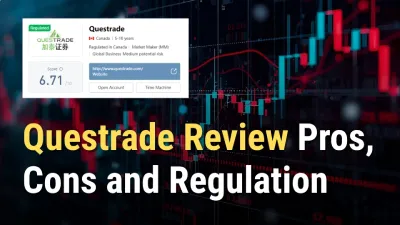简体中文
繁體中文
English
Pусский
日本語
ภาษาไทย
Tiếng Việt
Bahasa Indonesia
Español
हिन्दी
Filippiiniläinen
Français
Deutsch
Português
Türkçe
한국어
العربية
Proprietary Trading Firms vs. CFD Brokers – Which is Better?
Abstract:In online trading, proprietary trading firms and CFD brokers represent two prominent models, each offering distinct opportunities and facing unique challenges. Understanding their differences can aid traders in making informed decisions about their trading strategies and investments.

In online trading, proprietary trading firms and CFD brokers represent two prominent models, each offering distinct opportunities and facing unique challenges. Understanding their differences can aid traders in making informed decisions about their trading strategies and investments.

Proprietary trading firms, often called “prop firms,” trade assets using their own capital. Traders at these firms use sophisticated strategies to generate profits, with a share of the profits going to the traders. One key advantage is that traders do not need to invest their own money, which mitigates personal financial risk. These firms provide capital, allowing traders to focus solely on their strategies without worrying about potential losses of their own funds.
Proprietary trading firms offer access to advanced trading platforms, research, and tools that might be otherwise costly or inaccessible. This professional environment can significantly enhance a trader's performance and growth. Additionally, successful traders can earn substantial financial rewards through profit-sharing agreements. Many prop firms also offer extensive training programs and mentorship, making them an attractive option for novice traders looking to develop their skills with professional guidance.
However, there are downsides. A significant portion of the profits is retained by the firm, meaning traders do not keep all the profits they generate. The high-pressure environment can lead to intense performance expectations, and stringent risk management rules can limit a traders freedom to implement their strategies fully. Job security can also be a concern, as underperformance can lead to quick termination in this high-stakes setting.

CFD (Contract for Difference) brokers allow traders to speculate on the price movements of various financial instruments without owning the underlying assets. CFDs are derivatives that let traders go long or short on markets such as stocks, indices, commodities, and forex.
CFD brokers typically offer high leverage, enabling traders to control large positions with a relatively small capital outlay. This leverage can amplify profits but also increases the risk of significant losses. CFD trading provides access to a broad range of markets and instruments, allowing for diversification and strategic responses to different market conditions. Traders can speculate on both rising and falling markets, and avoid the complexities associated with owning actual assets, such as storage or settlement issues.
Despite these advantages, CFD trading comes with risks. The leverage that enhances profit potential can also magnify losses, making risk management crucial. Additionally, the costs associated with CFD trading, including spreads, commissions, and overnight fees, can erode profits. Some CFD brokers operate as market makers, taking the opposite side of their clients' trades, which can create conflicts of interest. The regulatory environment for CFD trading varies by jurisdiction, affecting the safety and reliability of CFD brokers.

Choosing between proprietary trading firms and CFD brokers depends on individual goals, experience levels, and risk tolerance. Proprietary trading firms are suitable for those who prefer to trade without risking personal capital and value a structured, professional environment with potential for significant financial rewards and professional growth. Conversely, CFD brokers cater to traders with a higher risk appetite who are comfortable with leverage and seek flexibility in speculating on various markets.
In summary, both proprietary trading firms and CFD brokers offer unique benefits and challenges. Prop firms provide a professional setup with reduced personal financial risk but involve high pressure and profit-sharing constraints. CFD brokers offer flexibility and high leverage but come with significant risk and potential conflicts of interest. Understanding these dynamics is essential for making an informed decision in the competitive realm of online trading.

Disclaimer:
The views in this article only represent the author's personal views, and do not constitute investment advice on this platform. This platform does not guarantee the accuracy, completeness and timeliness of the information in the article, and will not be liable for any loss caused by the use of or reliance on the information in the article.
Read more

Seaprimecapitals Withdrawal Problems: A Complete Guide to Risks and User Experiences
Worries about Seaprimecapitals withdrawal problems and possible Seaprimecapitals withdrawal delay are important for any trader. Being able to get your money quickly and reliably is the foundation of trust between a trader and their broker. When questions come up about this basic process, it's important to look into what's causing them. This guide will tackle these concerns head-on, giving you a clear, fact-based look at Seaprimecapitals' withdrawal processes, user experiences, and trading conditions. Most importantly, we'll connect these real-world issues to the single most important factor behind them: whether the broker is properly regulated. Understanding this connection is key to figuring out the real risk to your capital and making a smart decision.

iFX Brokers Review: Do Traders Face Withdrawal Issues, Deposit Credit Failures & Free Coupon Mess?
Have you had to pay several fees at iFX Brokers? Had your trading profit been transferred to a scamming website, causing you losses? Failed to receive withdrawals from your iFX Brokers trading account? Has your deposit failed to reflect in your trading account? Got deceived in the name of a free coupon? Did the broker officials not help you in resolving your queries? Your problems resonate with many of your fellow traders at iFX Brokers. In this iFX Brokers review article, we have explained these problems and attached traders’ screenshots. Read on!

NinjaTrader Exposed: Why Traders are Calling Out NinjaTrader’s Lifetime Plan & Chart Data
Did NinjaTrader onboard you in the name of the Lifetime Plan, but its ordinary customer service left you in a poor trading state? Do you witness price chart-related discrepancies on the NinjaTrader app? Did you have to go through numerous identity and address proof checks for account approval? These problems occupy much of the NinjaTrader review online. In this article, we have discussed these through complaint screenshots. Take a look!

Questrade Review Pros, Cons and Regulation
Is Questrade legit? Yes—CIRO regulated broker offering stocks, ETFs, forex, CFDs, bonds, and more with low fees and modern platforms.
WikiFX Broker
Latest News
Axi Review: A Data-Driven Analysis for Experienced Traders
INZO Regulation and Risk Assessment: A Data-Driven Analysis for Traders
GGCC Bonus and Promotions: A Data-Driven Analysis for Experienced Traders
Close Up With WikiFX —— Take A Close Look At Amillex
CapEx Spending On AI Is Masking Economic Weakness
Questrade Review Pros, Cons and Regulation
AccentForex Review: Is It Safe to Invest or Scam?
Cleveland Fed's Hammack supports keeping rates around current 'barely restrictive' level
Delayed September report shows U.S. added 119,000 jobs, more than expected; unemployment rate at 4.4%
The CMIA Capital Partners Scam That Cost a Remisier Almost Half a Million
Currency Calculator



